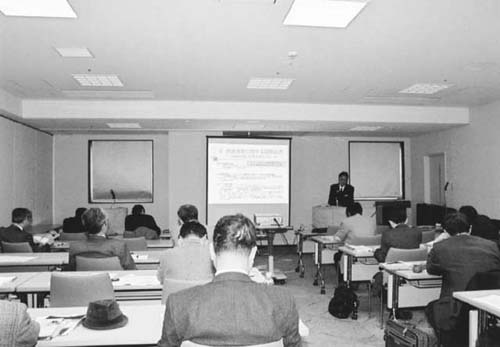Japan's Official Development Assistance White Paper 2006
Main Text > Part II ODA DISBURSEMENTS IN FISCAL YEAR 2005 > Chapter 2 Details about Japan's ODA > Section 5. Formulation and Implementation of ODA Policy > 2. Increasing Public Participation > (4) Information Disclosure and Public Relations
(4) Information Disclosure and Public Relations
ODA plays a big role in Japan's diplomacy. It is essential to gain widespread public understanding of and support for ODA. For this reason, the Government is working on a broader disclosure of information concerning ODA.
A. Vigorous Public Relations and Provision of Information within Japan
Specific measures to provide information concerning ODA and create opportunities for Japanese citizens to come into contact with ODA activities include the issuance of government publications such as the ODA White Paper and the Diplomatic Blue Book, as well as the following:
(i) ODA Homepage and Mail Magazine/ODA Newspaper
Designed to enhance disclosure of information, the ODA homepage of MOFA, as well as the ODA websites of JICA, JBIC, the Plaza for International Cooperation, and other organizations relay timely information concerning ODA and provide introductions to ODA in easy-to-understand formats.62
In addition to the ODA homepage, MOFA also issues the ODA Mail Magazine. As of October 25, 2006, the ODA Mail Magazine had been issued 101 times. The magazine relays timely topics and information relating to economic cooperation and includes episodes written by Japanese embassy staff members, JOCVs, and Senior Volunteers about their actual experiences in the field, as well as introducing ODA-related anecdotes. Anyone can receive the magazine by registering on the ODA website. As of the end of March 2006, about 12,500 people had registered.
MOFA also issues the ODA Newspaper which contains the latest information regarding ODA on a monthly basis. The newspapers are distributed to educational institutions, libraries, and similar locations around the country.
(ii) Dialogue with the Public
As part of efforts to promote dialogue with the public, ODA town meetings are held at various places around the country to inform the public of how ODA reform is being carried out and to listen directly to the opinions of the general public regarding ODA and these reform efforts. By February 2006, 31 meetings had been held where frank discussions took place between experts, members of the Second Consultative Committee on ODA, staff members of MOFA, and the general public.
And as a more flexible way to promote dialogue with the public, MOFA began the ODA Lecture Series from October 2005. In the lecture series, personnel from the then Economic Cooperation Bureau of MOFA63 visit high schools, colleges, graduate schools, local municipalities (international associations), NGOs, and similar venues to explain ODA and international cooperation in general. The lecture series has been held five times as of March 2006.

A scene of the fourth of the ODA Lecture Series
Chart II-37 ODA Town Meetings and Lectures Held in FY2005

(iii) ODA Citizen Monitoring Program
The aim of the ODA Citizen Monitoring Program is to promote a proper understanding of the significance and importance of ODA by dispatching monitors selected from the general public who are interested in ODA to ODA project sites, thereby giving them a firsthand opportunity to visit Japan's ODA project sites and to offer their views and impressions concerning ODA. This program started in FY1999, and by FY2005 a total of 655 monitors had viewed 401 ODA project sites in 25 developing countries in Asia, Africa, and Latin America. Participants have reported, for example, that they have deepened their understanding of the role that ODA plays in the development and stability of developing countries and of the need for such assistance. Moreover, there are also people who have deepened their interest in international cooperation and decided to take part in ODA as JOCV and Senior Volunteers on the incentive of their participation as monitors. The public's understanding of ODA is expected to continue to expand through this program.
(iv) Television Programs for Public Relations in Japan
Since FY1997 the Government has created and televised a series of regular programs on ODA. The series is designed to introduce to the general public how Japan's ODA is regarded by developing countries and what benefits it has brought, and to deepen the understanding of ODA of the viewers. In FY2005 five-minute segments were televised once each week on Japan's ODA in the Philippines, Kenya, Kazakhstan, Indonesia, Guatemala, and Bangladesh, with the average ratings reaching 5.2%.
B. Strengthening of the Dissemination of Information to the International Community
In addition to public relations within Japan, it is also important that Japan's active international contribution through ODA is properly understood and supported overseas.
In order to ensure that Japan's assistance is evaluated correctly overseas and to publicize the fact that each individual project was implemented through Japan's assistance, Japan has cooperated in interviews with the local press by such means as giving press releases at signings and handover ceremonies, attaching a Japanese flag sticker (in English or Arabic) and the Japanese ODA logo (in English, French, Spanish, Arabic, or Portuguese) to goods supplied through assistance, setting up signboards, and so on.
In order to publicize Japan's ODA policies and results widely to the people of the recipient country, Japan has broadcasted television programs that introduce Japan's ODA. In FY2005 programs were televised in seven countries, including Indonesia, Nigeria, Nepal, and Ecuador. Japanese embassies have arranged visits to Japan's ODA project sites for the local press and have created opportunities for the local media to gather information on Japan's ODA projects. Furthermore, Japanese embassies disseminate information via various lectures, as well as websites and e-mail bulletins prepared in both English and the local language. Also, in cooperation with JICA and JBIC, Japanese embassies have prepared and distributed various pamphlets concerning Japan's ODA. To the international community as well, including other donor countries, Japan is taking active measures to disseminate information through daily diplomatic efforts and international conferences, as well as through various symposiums, seminars, and websites.


 Next Page
Next Page